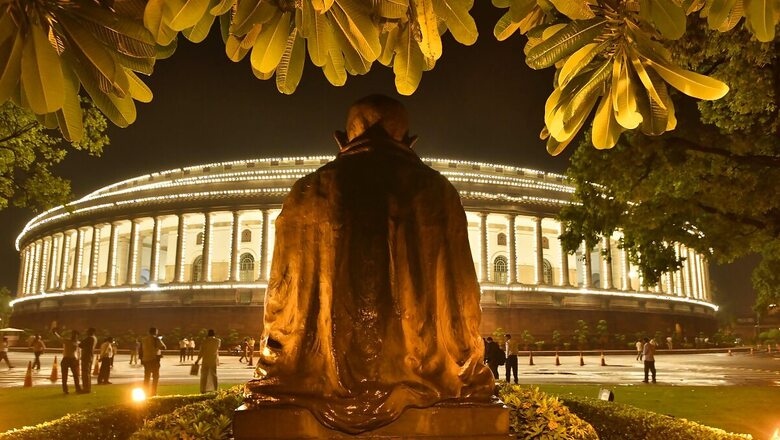
views
The Narendra Modi government has called for a special session of Parliament from September 18 to 22, making it the 13th Session of the 17th Lok Sabha and the 261st Session of the Rajya Sabha.
With the agenda of the special session not public yet, speculation has ranged from early general elections to introduction of crucial bills like the Uniform Civil Code, One Nation-One Election, Women’s Reservation Bill, or even the restoration of Jammu & Kashmir’s statehood. The session may also see a resolution on India’s enlarged role in the world with its G20 presidency.
The history of special sessions can be divided into two parts — proper special sessions with debates or discussions, and the midnight sessions without any debates. The agenda has been to either celebrate a historical legacy like the Indian freedom struggle and Indian Independence or to pass a bill, as in the case of the GST rollout in 2017. In that sense, they all hold a special place in the parliamentary calendar and history of democratic India.
SPECIAL SESSIONS WITH DEBATES
- November 26-27, 2015: A tribute to Dr BR Ambedkar on his 125th birth anniversary, the two-day special sitting in the Lok Sabha and the Rajya Sabha was part of year-long celebrations to pay respects to the architect of the Indian Constitution. The theme was to discuss its polity’s commitment to the Constitution. The same year, the Government of India declared November 26 as Constitution Day to raise awareness on Dr Ambedkar’s thoughts as part of his birth anniversary celebrations.
- August 26 to September 1, 1997: The special session was organised to mark 50 years of India’s independence. The agenda of the six-day session was to focus on the country’s achievements, discuss its inadequacies, and the road ahead on the path to development.
- November 1962: The Government of India, under Prime Minister Jawaharlal Nehru, called the Special Session after the then Jan Sangh Leader Atal Bihari Vajpayee pressed for it. The agenda was a discussion on India-China war situation. The special sitting was held while the war was still on with Nehru’s remarks and Vajpayee’s scathing observations during the debate on November 8 and 9.
MIDNIGHT SPECIAL SESSIONS
- August 14-15, 1947: The first session of the Indian Parliament was held on the eve of India’s independence to witness the transfer of power from the British authorities to the Indian people. India began its independent, sovereign journey after 200 years of colonialism, as reflected in Nehru’s ‘Tryst With Destiny’ speech.
- August 14-15, 1972: The session was held to celebrate 25 years of India’s independence.
- August 9, 1992: The midnight session was organised to mark the 50th anniversary of the ‘Quit India’ or ‘Bharat Chhodo Movement’. Mahatma Gandhi, with his ‘do or die’ speech on August 8, 1942, had launched the Quit India Movement that dealt the fatal blow to British colonialism in India.
- August 14-15, 1997: The midnight session was organised to mark 50 years of independence.
- June 30, 2017: It was the last special session organised in the Indian Parliament to mark the GST rollout across India the next day.
SPECIAL SESSIONS IN LOK SABHA OR RAJYA SABHA
Both Lok Sabha and Rajya Sabha have separately held special sessions at times. The Lok Sabha organised a special session on May 13, 2012, a Sunday, to commemorate the 60th anniversary of the first sitting of the Indian Parliament.
Special sessions were organised in the Rajya Sabha in 1977 and 1991 when the Lok Sabha was under dissolution to decide on the President’s Rule. The 1977 special session, or the 99th session on February 28 and March 1, was for the extension of President’s Rule in Tamil Nadu and Nagaland. The 158th Session on June 3-4, 1991 was centred around the approval of President’s Rule in Haryana.



















Comments
0 comment